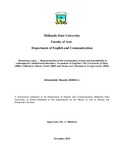Please use this identifier to cite or link to this item:
https://cris.library.msu.ac.zw//handle/11408/2138Full metadata record
| DC Field | Value | Language |
|---|---|---|
| dc.contributor.author | Mkandla, Sikhululekile | - |
| dc.date.accessioned | 2017-06-22T16:06:29Z | - |
| dc.date.available | 2017-06-22T16:06:29Z | - |
| dc.date.issued | 2015 | - |
| dc.identifier.uri | http://hdl.handle.net/11408/2138 | - |
| dc.description.abstract | This study focuses on the crisis of masculinity during Zimbabwe’s post year 2000 socio-economic and political degeneration. Through a masculinist re-reading of Tagwira’s The Uncertainty of Hope (2006), Chikwava’s Harare North (2010) and Nyota et al’s Hunting in Foreign Lands (2010) I seek to show the difficulties men face in sustaining the normative masculine roles as providers and protectors of families, communities and the nation within a context of political insecurity, job uncertainty, high unemployment, hyper-inflation, paralysis of basic services and scarcity of basic commodities. These crises undermined the legitimacy of patriarchal power by eroding men’s capacity as providers, a factor upon which their dominance of women has traditionally been premised. Already empowered by the global movement for their emancipation, women resolutely rose to fill the provider gap in ways that displaced men from an ages-old authority that hinged on women’s dependent status. I argue therefore that with this marked emergence of feminine masculinities, the crisis experiences inevitably fostered a new gender order within which it proved difficult to “…remain a man” within the confines of normative masculinity. The study is theoretically grounded in post-colonial theory and social constructionism, both theories which enable the tracing of the changes that have affected the homogenizing authority of patriarchal ideology upon which male supremacy is based. It is evident that not all men benefit from the assumed patriarchal privilege as they are unequally positioned on the patriarchal hierarchy. The post-colonial lens also enables an analysis of the entwinement between national and masculine identity to show how national instability disrupts men’s ability to meet their normative masculinity roles as providers and protectors while by drawing from social constructionism I also show how both national and male identity are not cast in stone but are unstable and subject to societal shifts and contingent imbalances. There is evidence in the selected texts of the entangled relationship between man and nation with both being in an unhealthy state of crisis, with their grand narratives subject to question and necessitating the re-envisioning of new orders. Through this study I have depicted that masculinity as identity is not as simple and linear as patriarchal ideology often conditions us to believe. | en_US |
| dc.language.iso | en | en_US |
| dc.publisher | Midlands State University | en_US |
| dc.subject | Masculinity | en_US |
| dc.subject | Zimbabwe | en_US |
| dc.title | ‘Remaining a man…’ representations of the constructions of men and masculinities in contemporary Zimbabwean literature: an analysis of Tagwira’s The uncertainty of hope (2006); Chikwava’s Harare north (2009) and Nyota et al’s Hunting in foreign lands (2010). | en_US |
| item.grantfulltext | open | - |
| item.languageiso639-1 | en | - |
| item.fulltext | With Fulltext | - |
| Appears in Collections: | Master Of Arts In African And Diasporan Literature In English | |
Files in This Item:
| File | Description | Size | Format | |
|---|---|---|---|---|
| MKANDLA S MAADL DISSERATION 2015.pdf | Full Text | 916.01 kB | Adobe PDF |  View/Open |
Items in MSUIR are protected by copyright, with all rights reserved, unless otherwise indicated.


